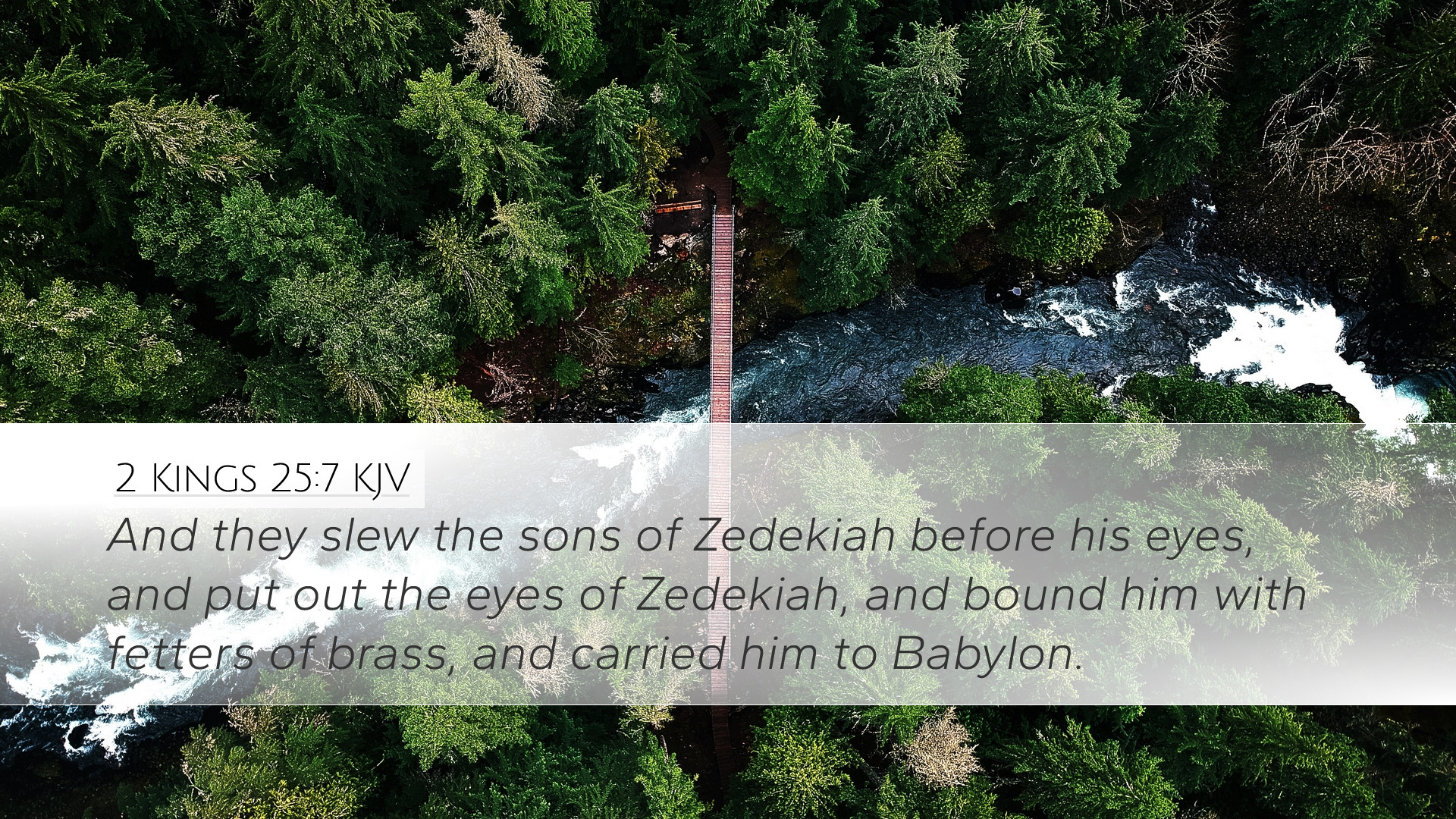Commentary on 2 Kings 25:7
Verse: "And they slew the sons of Zedekiah before his eyes, and put out the eyes of Zedekiah, and bound him with chains, and carried him to Babylon."
Introduction
This verse serves as a grievous conclusion to the account of King Zedekiah and the fall of Jerusalem. It exemplifies the dire consequences of disobedience to God and the intense suffering that follows national judgment. This commentary draws insights from several public domain authors to illuminate the significance of this verse.
Historical Context
The events in this chapter occur during the Babylonian siege of Jerusalem, which culminated in the destruction of the city and the temple. Zedekiah, the last king of Judah, had previously disregarded the prophetic warnings of Jeremiah, leading him to a catastrophic end.
Matthew Henry comments that Zedekiah's fate illustrates the totality of God’s judgment. He was warned but chose rebellion against God’s law. The execution of his sons before his eyes signifies the utter devastation of his lineage and legacy.
Theological Implications
This verse emphasizes the theological themes of judgment, retribution, and the sovereignty of God over nations. Albert Barnes notes that God's justice is executed not just against individuals but against entire nations that turn away from Him. Zedekiah's punishment serves as a solemn reminder of the consequences of sin, particularly for leaders who misguide their people.
Moreover, the act of blinding Zedekiah symbolizes his spiritual blindness. Adam Clarke elaborates that Zedekiah’s inability to see post-assault depicts a deeper reality: the loss of spiritual insight and the inability to perceive God’s will due to continued disobedience and defiance.
The Role of Prophecy
Throughout the history of Israel, prophets delivered God’s messages, often warning kings of impending judgment. Zedekiah’s story is steeped in the prophetic tradition as seen through Jeremiah’s warnings. Matthew Henry reminds us that the rejection of prophetic counsel leads not only to personal ruin but also to national disaster.
Further, the tragic end of Zedekiah is a fulfillment of prophecy. As Clarke points out, this reflects the immutable truth of God's word - His prophecies come to pass, whether judgment or restoration.
Lessons for Contemporary Believers
This verse offers critical insight for modern believers regarding leadership, obedience, and the nature of divine justice. Barnes underscores that leaders hold a sacred responsibility to act in accordance with God's will. Their failures can lead to disastrous consequences for those they lead.
Moreover, Zedekiah's story teaches about the importance of humility and the recognition of our limitations. Zedekiah failed to heed God’s warnings, thus highlighting the necessity for believers to remain vigilant in their spiritual awareness. Clarke argues that believers today must listen intently to God’s voice through Scripture and the guidance of the Holy Spirit to avoid similar fates.
- Obedience to God: The necessity of upholding God’s commandments to avert personal and corporate downfall.
- Leadership Integrity: A reminder for leaders to strive for righteousness and faithfulness in their duties.
- Spiritual Vigilance: The importance of remaining watchful and receptive to divine instruction.
Conclusion
In summation, 2 Kings 25:7 encapsulates a pivotal moment in biblical history with profound lessons. The tragic end of Zedekiah stands as a testament to the severe implications of neglecting divine wisdom. Reflecting on this verse encourages believers, scholars, and church leaders alike to advocate for a faithful adherence to God’s word and a diligent pursuit of His will.


